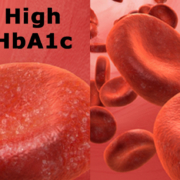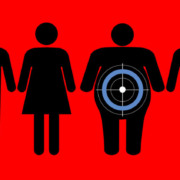Dr. Chet’s Health Memos
 If it’s in the health news today, I’ll be writing about it as soon as I read the research, both old and new. With my email Health Memos, you’ll know more about making lifestyle choices that will help you get and keep good health. These free, concise updates on health are emailed to subscribers twice a week. Subscribe today and get a free MP3, in English or Spanish, of Dr. Chet’s Top Ten Tips—Small Changes for a Healthier Life.
If it’s in the health news today, I’ll be writing about it as soon as I read the research, both old and new. With my email Health Memos, you’ll know more about making lifestyle choices that will help you get and keep good health. These free, concise updates on health are emailed to subscribers twice a week. Subscribe today and get a free MP3, in English or Spanish, of Dr. Chet’s Top Ten Tips—Small Changes for a Healthier Life.
Type 2 Diabetes: Is Medication the Cure?
When I work out on the elliptical trainer in the fitness center, I wear ear plugs so I can think without the loud music but I can see the television monitors. A commercial came on that showed people having a wonderful time. Out for a walk. In the pool. Grooving at work. Pictures with family. It took a while to figure out that it was a commercial for a type 2 diabetes medication. I can understand why people might find the medication appealing. Everyone was having a ball!
The best that type 2 diabetes medication can do is to keep . . .
We're sorry, but this content is available to Members and Insiders only.
If you're already a DrChet.com Member or Insider, click on the Membership Login link on the top menu. Members may upgrade to Insider by going to the Store and clicking Membership; your membership fee will be prorated automatically.
Prediabetes: What Now?
The messages this week have talked about the risk factors for prediabetes and how many people don’t know what they are. It’s time to change that, at least in those of you who read the messages. Please feel free to pass them along to anyone you feel might also be unaware.
How do you know if you’re actually prediabetic? It requires a blood test for a specific protein called HbA1c. This protein indicates the amount of sugar that’s been in your blood stream for the past 90 days. The number for your blood sugar might be . . .
We're sorry, but this content is available to Members and Insiders only.
If you're already a DrChet.com Member or Insider, click on the Membership Login link on the top menu. Members may upgrade to Insider by going to the Store and clicking Membership; your membership fee will be prorated automatically.
Prediabetes Risk Factors
Based on the recently published study that showed only about 12% of those who were pre-diabetic realized it, it’s time to provide you with a list of risk factors for prediabetes. Let’s get right to it.
Weight
The higher your Body Mass Index, the greater your risk. You can check out your BMI in the Health Info section of drchet.com.
Waist Circumference
The larger your waist, the greater the risk. Men should be less than 40 inches and women less than 35 inches . . .
We're sorry, but this content is available to Members and Insiders only.
If you're already a DrChet.com Member or Insider, click on the Membership Login link on the top menu. Members may upgrade to Insider by going to the Store and clicking Membership; your membership fee will be prorated automatically.
Diabetes: Are You in the Dark?
As I was doing intervals at the middle school running track last week, several trucks from the town showed up and began to erect a tent, most likely for the 4th of July festivities the following day. As they began to erect the tent, a woman who appeared to be their supervisor showed up with what looked like a dozen donuts, based on the box. It’s a nice gesture and seemed to be appreciated, but in my opinion, it was not the best choice.
I can’t stop myself from watching and evaluating people as I go about my . . .
We're sorry, but this content is available to Members and Insiders only.
If you're already a DrChet.com Member or Insider, click on the Membership Login link on the top menu. Members may upgrade to Insider by going to the Store and clicking Membership; your membership fee will be prorated automatically.
The Bottom Line on Tattoos and Skin Cancer
Based on the research to date, there doesn’t appear to be a significant risk of tattoos causing skin cancer. I’ve explained this before in a memo several years ago, but here’s the gist of it: I’m sticking this issue under the heading “Reserve Judgment.” When there’s no statistical significance but there may be a relationship between variables, that’s the statistical term that’s appropriate. I know you’re thinking, “Dr. Chet—50 cases. Ever! C’mon, man. What’s your problem?” There are three reasons I’m reserving judgment.
First, while tattoo businesses have . . .
We're sorry, but this content is available to Members and Insiders only.
If you're already a DrChet.com Member or Insider, click on the Membership Login link on the top menu. Members may upgrade to Insider by going to the Store and clicking Membership; your membership fee will be prorated automatically.
Tattoos and Skin Cancer Research
The research question of the week is do people with tattoos have an increased risk of skin cancer? Let me tell you what I found.
In a study published in Lancet Oncology, researchers examined the medical literature for case studies on tattoos and skin cancers of various types (1). They found 50 cases; 16 of them were melanoma. That doesn’t seem to be an overwhelming number of skin cancer cases when you consider the 60 million or so people who have tattoos. The researchers concluded that at this point, the number of cases of skin cancer is more likely . . .
We're sorry, but this content is available to Members and Insiders only.
If you're already a DrChet.com Member or Insider, click on the Membership Login link on the top menu. Members may upgrade to Insider by going to the Store and clicking Membership; your membership fee will be prorated automatically.
Do Tattoos Increase Skin Cancer Risk?
The other day, out of the blue, Paula asked me a question: “Do you think people with tattoos have more undetected skin cancer?” You can’t help but notice that more and more people of all ages are getting elaborate tattoos, some covering extensive parts of their arms and legs—the areas most likely to get increased exposure to the sun. A section of black ink could mask a rapidly growing black mole, for instance, and skin cancer could go unnoticed for longer.
Move forward 10 hours. I was changing to work out at the gym, and the guy a . . .
We're sorry, but this content is available to Members and Insiders only.
If you're already a DrChet.com Member or Insider, click on the Membership Login link on the top menu. Members may upgrade to Insider by going to the Store and clicking Membership; your membership fee will be prorated automatically.
PPIs and Heart Attacks: The Bottom Line
Here’s why the Stanford Study on PPIs and heart attacks is not as concerning as the press release and the study itself suggested (1-2): it comes down to the data mining.
The data-mining algorithm obtained a lot of data in addition to PPIs, diagnosed acid reflux, and heart disease. It collected data on blood lipids, systolic blood pressure, and smoking status. What it did not do was collect the heights and weights to determine BMI from the medical records. The researchers acknowledged that they had no data on diabetes as well. Of all the information that could . . .
We're sorry, but this content is available to Members and Insiders only.
If you're already a DrChet.com Member or Insider, click on the Membership Login link on the top menu. Members may upgrade to Insider by going to the Store and clicking Membership; your membership fee will be prorated automatically.
PPIs and Heart Attacks: A Closer Look
Today we’ll take a closer look at the Stanford Study I talked about on Tuesday (1). Before I do, I have to say that I’m in awe of the sheer data that was examined in this study. The lead author, Nigam Shah PhD, is a pioneer in this type of data-mining technique. The research wouldn’t have been possible if Stanford did not begin using electronic medical records in 1994. The program did not only read the diagnoses and other variables but also physician notes. Think how complicated a program would be required to do that!
And . . .
We're sorry, but this content is available to Members and Insiders only.
If you're already a DrChet.com Member or Insider, click on the Membership Login link on the top menu. Members may upgrade to Insider by going to the Store and clicking Membership; your membership fee will be prorated automatically.
Acid Reflux or Heart Attacks?
One of the most frequently asked questions I get is what to do about acid reflux. By the time most people ask, it’s a serious issue and they should see their physician. In most cases, they will be prescribed a proton-pump inhibitor or PPI. One of the people who uses a PPI is Paula. When she saw the headline “Heartburn Drugs May Boost the Risk of Heart Attacks,” she asked me to check it out because she didn’t want to have to choose between those two problems. Because I’m a great husband and I’d like . . .
We're sorry, but this content is available to Members and Insiders only.
If you're already a DrChet.com Member or Insider, click on the Membership Login link on the top menu. Members may upgrade to Insider by going to the Store and clicking Membership; your membership fee will be prorated automatically.










